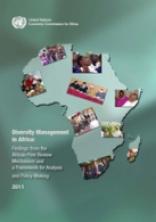Diversity Management in Africa

Considered to be the most innovative and important element of African Union’s NEPAD initiative, the African Peer Review Mechanism (APRM) was launched in March 2003 to address governance challenges facing Africa including systemic issues such as political rigidity characterized by executive dominance, political exclusion, especially in the executive and legislature, economic governance and conflicts, pointing to an urgent need to improve all aspects of good governance in the continent. The mechanism is the first of its kind in Africa, indeed in the world, that takes a comprehensive view of all the aspects of a country’s governance system. This is why some analysts have observed that the APRM has the real potential of playing a decisive role in “collective self-governance” thereby unleashing the continent’s economic and political energies for sustainable development.
One of the most significant achievements of the APRM to date has been its ability to diagnose systemic and structural issues that confront most African States in their governance systems. These are issues that require a holistic approach in the search for solutions because of the wider impact they have on the quality of governance in all its dimensions. Thus, the APRM country process has unveiled some major systemic issues that hamper governance, one of which is managing diversity.